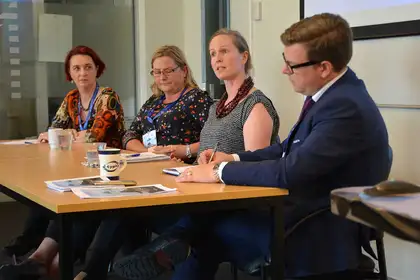
The Climate Communication Summit's 'Interaction with Government' panel discussion. Left to right: MP Dr Deborah Russell; MP Angie Warren-Clark; Catherine Wilson, Ministry for the Environment; and Professor Stephen Croucher from the Massey Business School.
Climate change is a complex issue that many people find overwhelming to think about. That is why Massey marketing lecturer Dr Pam Feetham decided to hold the Climate Communication Summit to discuss better ways to engage the New Zealand public with climate change initiatives to achieve a zero carbon future.
An experienced science communicator herself, Dr Feetham wanted to provide an interactive forum for academic climate researchers and government to share ideas. She invited two keynote speakers to the summit: Labour MP for New Lynn Dr Deborah Russell; and Professor Victoria Wibeck from the Centre for Climate Science and Policy Research, at Linköping University in Sweden.
Dr Russell discussed the difficulty of cutting through the busy schedules of MPs to have academic research heard, while Professor Wibeck explained how to motivate citizens into action. People are more responsive to mitigation if they know that their actions are worthwhile, Professor Wibeck said, giving the example of a successful mitigation campaign in her home town.
“Citizens in Linköping were more motivated to recycle their food and meat production waste and leftover restaurant waste when they were made aware of how far their city buses travelled on the biogas produced from the recycled waste,” she said.
Culture, community and climate change
Head of Massey’s School of Art Dr Huhana Smith and the University’s sustainability project manager Dr Jane Richardson argued for participatory research methods tailored to the ethnic groups that make up New Zealand’s diverse population. Dr Smith shared her experiences working with her Horowhenua hapu, who hold ancestral coastal farmland between the Ohau and Waikawa rivers. Through art and hui, the hapu were motivated to become involved in climate change initiatives, such as returning some of the coastal land to wetlands.
“Focus groups can provide deep insights into how community groups are thinking,” Dr Feetham said. “My research revealed focus group participants of Māori decent believed, as individuals, their mitigation efforts could make a difference. Māori expressed an inherent duty to take care of the land, in contrast to non-Māori groups, where the majority of participants felt their individual recycling efforts would not make a difference.”
Intercultural researcher Dr Franco Vaccarino then explained how Pasifika people use Talanoa, a natural way of expressing ideas through story-telling interlinked by relationships, to find solutions that address climate change impacts.
EQC chair in natural hazards planning, Massey’s Professor Bruce Glavovic, reflected on his case studies in the Whangaehu Valley and the Coromandel Peninsula, where community concerns about the impacts of climate change are vastly different. Collectively, these studies suggest several different methods of public engagement will be required to activate citizen buy-in to zero carbon initiatives across the culturally diverse population of New Zealand, he said.
Where to from here?
Summit facilitator Professor Stephen Croucher, head of the School of Communication, Journalism and Marketing, chaired the concluding government panel that discussed what the next steps would be. Participants agreed the value of exchanging knowledge in the summit format, which involved face-to-face interaction and discussion time, was more beneficial than reading academic papers.
Ministry of Environment engagement manager Catherine Wilson said she will introduce her team to the engagement methods discussed at the summit, while MP Angie-Warren Clark encouraged academics to present their research in lay-person’s language to increase access and understanding.
Massey University intends to continue the government interaction by hosting the summit biannually.